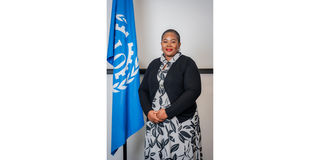ILO warns of job security threats, unveils strategic response

ILO Country Director Caroline Mugalla. PHOTO | COURTESY
What you need to know:
- The ILO has supported women and youth in accessing economic opportunities, working with institutions such as NMB Bank to increase access to financial and non-financial services, especially for small businesses.
Singida. The International Labour Organization (ILO) has flagged technological transformation, the rise of artificial intelligence (AI), climate change, and population growth as among the key threats to employment, economic stability, and energy systems worldwide.
The warning was delivered on 1 May 2025 during national Labour Day celebrations in Singida by ILO Country Director Caroline Mugalla, representing the ILO Director-General, Gilbert Houngbo.
Mugalla said these challenges are reshaping multiple sectors, creating a need for new skills, increasing political tensions, disrupting supply chains, and straining global resources meant for sustainable development.
“To address these issues, the ILO has launched initiatives including the Global Coalition for Social Justice and the Global Accelerator on Jobs and Social Protection for Just Transitions,” she said, adding that the aim is to promote solidarity, innovation, and a resilient future of work.
Through these initiatives, the ILO has supported women and youth in accessing economic opportunities, working with institutions such as NMB Bank to increase access to financial and non-financial services, especially for small businesses.
She said that through a joint UN programme in collaboration with the Government and the National Economic Empowerment Council in Kigoma, thousands of women and youth entrepreneurs have secured new opportunities.
The ILO has also concluded a study on the informal sector and launched a mobile platform and registration guide to link entrepreneurs with formal government systems.
Mugalla said the ILO is providing technical support to the National Health Insurance Fund (NHIF), including actuarial assessments to boost efforts toward universal health coverage.
She also cited ongoing collaboration with national institutions, such as the Commission for Mediation and Arbitration (CMA) and the Labour Court, to improve dispute resolution capacity and promote decent, safe, and productive workplaces.




